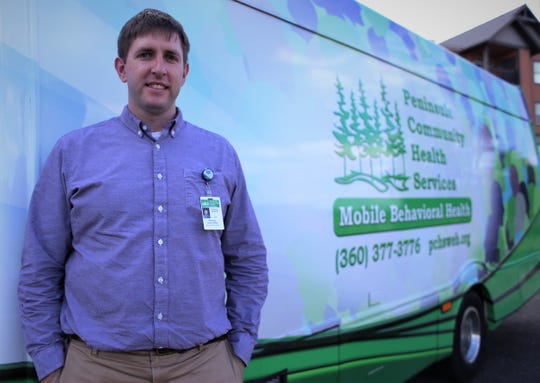BREMERTON, WA | by Jessica Darland | June 4, 2019
Original article can be found at: https://www.kitsapsun.com

Peninsula Community Health Services recently rolled out a new bus to join its fleet of healthcare-on-wheels. This one will reach those in need of mental health care or help to curb substance abuse.
The bus will travel throughout Kitsap County to offer care to those who struggle getting treatment in a traditional clinic setting. On the bus is a community health worker, a licensed mental health counselor and a chemical dependency professional. Services the mobile behavioral health clinic provides include community resource information, counseling, crisis intervention, coping skills, stress management, substance abuse support, basic care coordination and limited psychiatric services.
“What we offer in our brick and mortar clinics drives what we offer in our mobile services,” said Tony Lyon-Loftus, PCHS associate medical director for the mobile health team. “There’s a subset of our population that doesn’t access brick-and-mortar services whether it’s because they’re homeless, they live in a retirement home, they don’t have insurance or whatever.”
Peninsula Community Health Services rolled out a new bus to treat walk-in patients who need mental health care help curbing substance abuse.
Peninsula Community Health Services rolled out a new bus to treat walk-in patients who need mental health care help curbing substance abuse. (Photo: Jessie Darland)
Lyon-Loftus says the goal of the mobile health unit is to go where the people are, bringing the services to those who may not reach out for them on their own. The bus tries to go to areas where people are already congregated, comfortable and accessible by public transit. It is primarily a walk-in service, though there are appointment slots available.
“We are so excited to bring more of our services directly out into the community,” said Jennifer L. Kreidler-Moss, CEO of Peninsula Community Health Services. “Providing care at places patients find more accessible across our counties is an organizational goal we are trying to live up to. We believe this is especially important for those who might be struggling with mental health or substance use issues.”
Bringing services directly to people
Even folks without insurance can get help at the mobile clinics. The behavioral health mobile unit has a community health worker who doubles as an insurance navigator, helping to make sure the person seeking service is a registered patient and takes their insurance information. The clinic helps clients obtain insurance if they don’t have it.
The bus also features a chemical dependency professional (CDP) and a medication-assisted-therapy (MAT) program.
Reba Harris’ first day as a chemical dependency professional on the mobile clinic was Monday. She’s excited about bringing resources to people at times and places convenient for them. In the medication-assisted-therapy program, Harris or another chemical dependency professional meets with patients to do an informal evaluation and gets background information on the substance use, then confers with a prescriber about what form of treatment will work best. Patients are connected with other resources, including Alcoholics Anonymous or Narcotics Anonymous meetings and group therapy.
“There are a lot of people in this community that want this community healthy,” Harris said. “I’m able to provide counseling to people who are struggling with a substance use disorder or a person who is not really sure on what services are available to them.”
A chemical dependency professional or mental health counselor uses this space to meet with patients.
Lyon-Loftus said the chemical dependency providers are invaluable to the prescribers who have limited face-to-face time with patients.
“The CDPs kind of back us up and go that extra step with the personal component that we just don’t have the training or bandwidth to provide,” Lyon-Loftus said. “So they take care of the person side and we take care of the medication side, and together we try to take care of both the physical addiction and the psycho-social reasons for the addiction.”
A licensed mental health counselor also works on the van for things like life coaching and teaching coping skills, anxiety management and crisis intervention.
Patients can continue seeing the same provider on the bus or in a traditional clinic, allows the care team to build a relationship with the patient. Lyon-Loftus, said.
The mobile team is still in the process of figuring out where it will have the biggest impact and how long it should stay in one place, but it hopes to have a more stable location schedule soon, Lyon-Loftus said. Besides the benefit of bringing care to patients, he said being able to test out services in different areas gives them insight into whether they could create a full-service brick-and-mortar clinic there.
The PCHS behavioral health bus travels throughout Kitsap County to libraries, apartment complexes and community centers to get care to those unable to make it to traditional brick-and-mortar clinics.
The PCHS behavioral health bus travels throughout Kitsap County to libraries, apartment complexes and community centers to get care to those unable to make it to traditional brick-and-mortar clinics.
Funding for the mobile behavioral health clinic’s staffing came in part from the Kitsap County Mental Health Tax, in which one-tenth of one percent of sales tax is allocated to assist chemical dependency or mental health treatment services.
The clinic’s current stops are Bay Vista, the Salvation Army, and the Sylvan Way Library — all in Bremerton — as well as libraries in the Port Orchard are, North Kitsap Fishline and other churches and community centers. The van’s schedule can be found at https://www.pchsweb.org/locations/mobile-behavioral-health-clinic/.
PCHS recently received funding from the state to get a mobile dental unit, which Lyon-Loftus says will hopefully be rolling out within the year.
Share this Post












